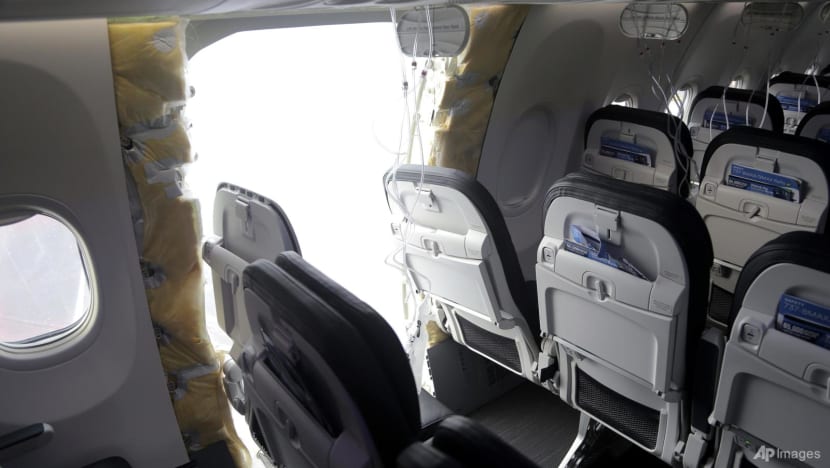Commentary: Boeing becomes the poor relation in duopoly with Airbus
On just about every metric, the European plane maker is trouncing its American rival, says Chris Bryant for Bloomberg Opinion.

A gaping hole where the panelled-over door had been at the fuselage plug area of Alaska Airlines Flight 1282 on Jan 7, 2024, in Portland, Oregon. (Photo: National Transportation Safety Board via AP)

This audio is generated by an AI tool.
BERLIN: When Boeing was building a seemingly unassailable position in commercial aviation in the 1960s and 70s, passengers’ faith in its relentless focus on quality inspired the slogan "if it ain’t Boeing, I ain’t going".
Following the latest calamity to befall the US aerospace giant - the in-flight blowout of a 737 Max door plug of a plane operated by Alaska Air Group that fortunately wasn’t fatal, unlike the two crashes involving 737 Max jets in 2018 and 2019 - aviation requires a new catchphrase that encapsulates Boeing’s shattered safety reputation and the ascendancy of its only serious rival. This nervous flier suggests "If it ain’t Airbus, the regular bus will do just fine".
In the wake of the Lion Air and Ethiopian Airlines disasters, I wrote that the Airbus-Boeing dupoly had become "extremely unbalanced". At this point, I’m running out of hyperbole to describe the starkly diverging fortunes of the two aircraft manufacturers.
Notwithstanding a punishing pandemic and supplier difficulties that have slowed Airbus’ advance, on just about every metric the European firm is now trouncing its US rival. Barring an unforced error, it’s hard to see the Americans catching up for years.
TORTOISE AND THE HARE
Airbus’ ascendancy has long reminded me of the allegory of the tortoise and the hare. For a long time, investors were transfixed by Boeing’s superior financial performance which Airbus struggled to match. The European company was formed via the merger of assorted national aerospace units, meaning Airbus’ factories were spread across several countries and governments were always interfering to ensure they weren’t disadvantaged.
Though it enjoyed impressive sales success, thanks to innovations such as fly-by-wire, Airbus was forever shooting itself in the foot, whether due to international bribery allegations or financial albatrosses such as the A380 superjumbo and A400m military transporter.
But Airbus’ persistence paved the way for the mess Boeing is in today. The 2010 launch of a more fuel-efficient version of the single-aisle A320 known as the “neo” prompted its archrival to hurry its riposte, the 737 Max, leading to design compromises that may have played a role in the two crashes.
The grounding of the 737 Max helped Airbus add to its lead in single-aisle jets - the cash cow of the aviation industry, which accounts for the vast majority of demand. The Europeans have capitalised on trade tensions that forced Boeing to pause deliveries to China and caused a long hiatus in Chinese orders.
While Airbus executives said at the Paris air show in June that the duopoly is "live and kicking", analysts at RBC Capital Markets expect Airbus to account for 60 per cent of narrow-body plane deliveries until 2026. Boeing’s latest safety issues will slow its production even more.
To be sure, Airbus has its own supplier issues, which constrain its ability to capitalise on this golden opportunity, the most serious being those affecting engines produced by RTX’s Pratt & Whitney unit for the A320 neo. This will require hundreds of jets to be grounded for inspections and may slow Airbus’ ambition to increase production rates. So, as my colleague Brooke Sutherland has noted, airline customers who want a new jet before the end of the decade may have no choice but to order from Boeing.
FLY AWAY
A hobbled rival isn’t necessarily a good thing from Airbus’ perspective, as it may prompt Boeing to develop new aircraft. But I think Airbus has little to fear on that front. Boeing has held back from building a mid-market aircraft to take on the long-range version of the A321 because executives worried it wouldn’t deliver the substantial fuel efficiency improvements that justify such massive investment.
Besides, Boeing’s balance sheet is in such a bad state - the US company has almost US$17 billion in negative net assets and US$39 billion of net indebtedness - it probably can’t afford it.
Airbus’ stock has recouped all the losses caused by the pandemic even as productivity remains suboptimal due to the thousands of extra workers the company has hired to enhance manufacturing resiliency. The shares touched a record high on Tuesday. With net cash likely to have exceeded €10 billion (US$10.9 billion) at the end of December, it’s also on the cusp of being able to return more money to shareholders.
Prioritising investors rather than investing in quality and resilience is what got Boeing into trouble - the US manufacturer spent around US$44 billion on share repurchases between 2013 and 2019, according to data compiled by Bloomberg. Airbus has always been far more conservative and may find other uses for its cash, including acquisitions.
Nevertheless, it would be no small irony were Airbus to partly echo Boeing’s cash-returning strategy. At that point, there will be no doubt that the tortoise has decisively beaten the hare.














